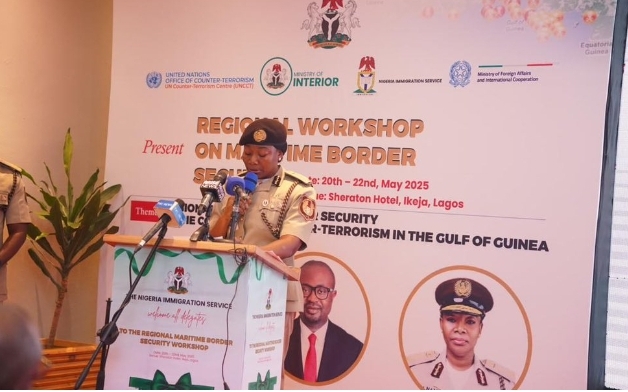Wednesday May 21, 2025|
The Nigeria Immigration Service (NIS) has reaffirmed its commitment to bolstering maritime border security as part of broader efforts to counter terrorism, piracy, and other transnational crimes threatening the Gulf of Guinea.
Comptroller-General of the NIS, Kemi Nandap, made this known on Tuesday at the opening session of a high-level Regional Workshop on Maritime Border Security, held in Abuja under the theme “Maritime Security in the Context of Counter-Terrorism in the Gulf of Guinea.”
Nandap stated that the initiative reflects the shared commitment of West and Central African nations to collectively address persistent maritime security threats, including arms trafficking, human smuggling, stowaways, and the movement of foreign terrorist fighters.
“The NIS plays a pivotal role in securing Nigeria’s maritime borders and preventing foreign terrorist fighters and criminal elements from breaching our territorial integrity,” she said. “Our threats are transnational—our response must be, too.”
Highlighting the agency’s strategic direction, Nandap revealed plans to expand the Border Management Information System (BMIS) to marine frontiers and leverage technologies such as the Advanced Passenger Information and Passenger Name Record (API/PNR) system to enhance intelligence gathering and document verification at ports.
She also underscored the agency’s alignment with regional frameworks such as the African Integrated Maritime Strategy 2050 and the ECOWAS Gulf of Guinea Strategy, noting that these continental plans are key to building a secure maritime corridor that enables sustainable economic development.
The Gulf of Guinea, which borders several key African nations including Nigeria, Ghana, Togo, Benin, Cameroon, and Equatorial Guinea, has long been identified as a hotspot for piracy, oil theft, and maritime crime. According to Nandap, these threats not only endanger shipping operations but also undermine regional stability and economic potential.
“This workshop underscores our collective resolve to counter these threats through policy reform, enhanced capacity, and strategic partnerships,” she said.
The Minister of Interior, Dr. Olubunmi Tunji-Ojo, who officially declared the workshop open, lauded the NIS for its proactive leadership in reshaping Nigeria’s border security posture. He emphasized that securing the nation’s maritime and land borders is critical to preserving national sovereignty and ensuring public safety.
“The federal government is ready to make the necessary decisions to secure Nigeria’s borders,” the minister stated, pledging continued support for agencies involved in migration and border management.
Participants at the workshop included representatives from security and intelligence communities across Africa, as well as from countries such as Germany, Italy, the United Kingdom, Denmark, Mauritius, the Philippines, and São Tomé and Príncipe. Their presence highlighted the international scope of the challenges facing the Gulf of Guinea and the global cooperation required to confront them.
Nigeria Boosts Maritime Border Security to Combat Gulf Terror Threats
